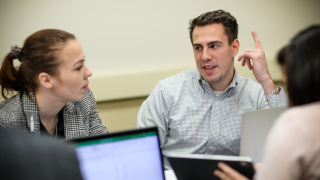How Do You Pronounce S-I-G-N-I-F-I-C-A-N-T?
Wednesday, March 10th, 2021

The ESL@SetonHall program (ESLP) and the EDST department are participating in a unique collaboration this semester. EDST student volunteers are working together with ESL Pronunciation class students to improve the international students' communication skills and to expand the American students' knowledge of the challenges facing English Language Learners.
Nine freshman EDST students — majoring in Elementary Education, Special Education, or Speech Pathology — volunteered for this project. The students attend the ESLP 0800 ESL Pronunciation class and work one-on-one or in small groups with students from Brazil, China, Jordan, Taiwan, Vietnam, and Yemen. The American students model the sounds of English, but also help with understanding and emulating American intonation, rhythm, and speech patterns through a variety of classroom activities, such as conversations, interviews, presentations, or video emulations.
Normally, learning English in the U.S. is like living in a giant language lab with multiple opportunities to use the language every day, but COVID-19 has severely limited meaningful interactions both on campus and in general daily life. "We realized that the program needed to create new venues for our students to practice their communication skills in order to ensure a successful transition to the U.S. university classroom," explained Adjunct Professor Diane Zediker-Pastore, who teaches the Pronunciation class.
To help fill that need, the ESL@SetonHall program reached out to Dr. Lauren McFadden, Associate Professor of Elementary & Special Education, who saw an opportunity to create a mutually beneficial situation for the EDST students. "This experience we've created allows our Ed Studies majors to gain first-hand knowledge of the issues facing English Language Learners. In addition, it provides an opportunity to work with the same types of students they will be teaching in their own classrooms," said Dr. McFadden.
The collaboration has roots in previous EDST coursework when it was a mandatory part of the Elementary Education program. This is the first time it has been all-volunteer with a group of highly motivated future educators, and the experience has been a success for everyone. The international students are grateful to have this built-in platform for communication practice and they take full advantage of the time to speak with "real Americans." Conversely, the American students are becoming more mindful of the many aspects involved in mastering English pronunciation and verbal communication, and in the process, they are learning about their own language.
As Dr. Bryan Meadows, Assistant Professor and ESL@SetonHall program director, commented, "We are excited to enhance our ESL students' learning experience while also helping develop globally aware servant leaders. We hope to expand this outreach to other groups within Seton Hall in the future."
The ESL@Seton Hall program serves students from all over the world, providing coursework for success in English academic language environments. The coursework design works best for individuals with at least an intermediate level of proficiency in English. Program participants are preparing to join undergraduate and graduate programs in the United States. More information about the ESL@Seton Hall program is available here.
Categories: Education






